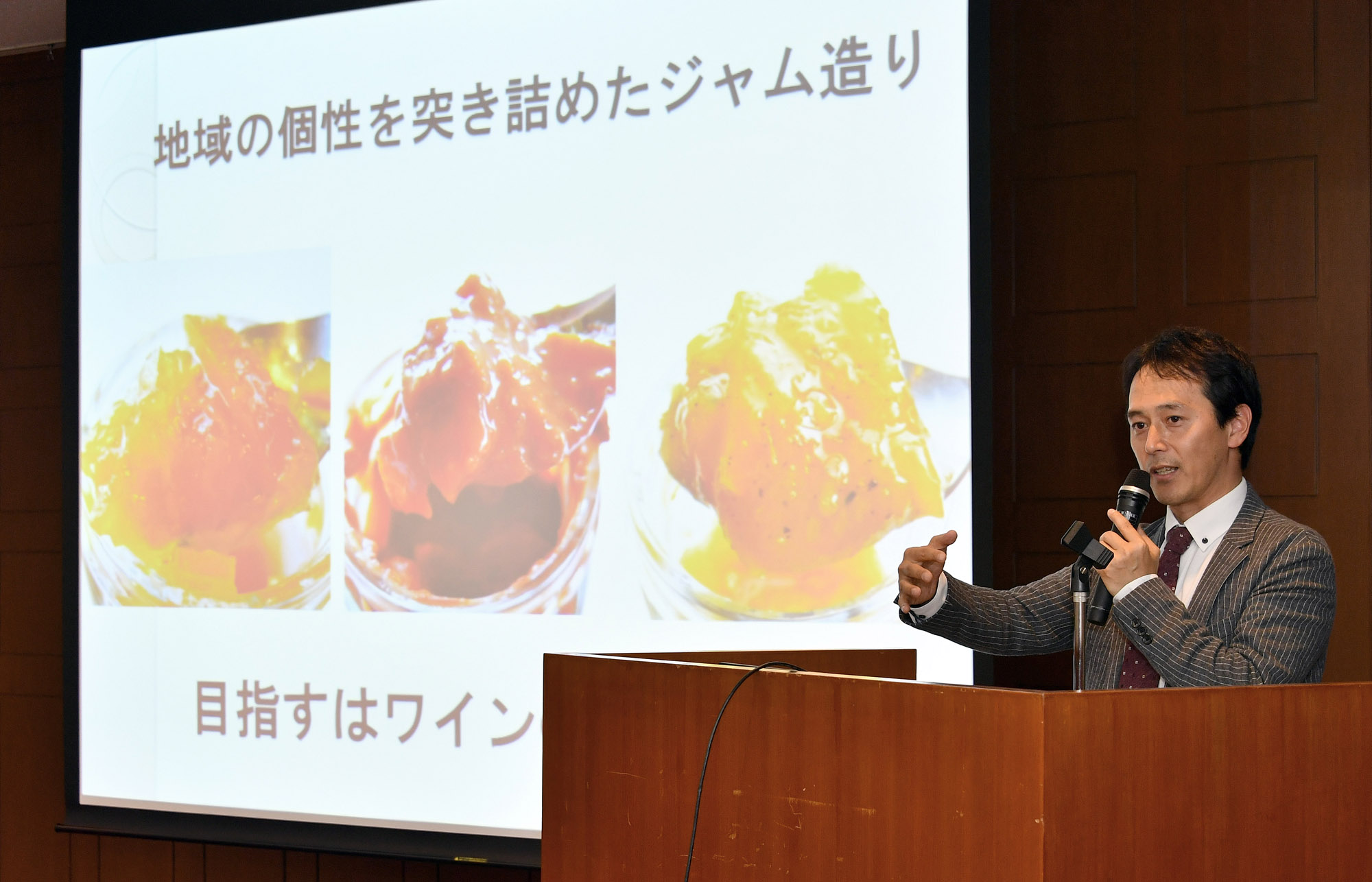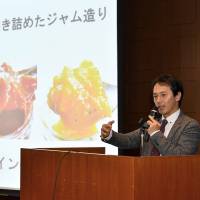In a bid to create a sustainable, content and circulating society, a homemade jam producer on a small island in Yamaguchi Prefecture strives to thoroughly make the most of available resources in the regional community for his business.
"Our company aims to create the 'sixth industry' in our island community," said Tadashi Matsushima, the owner of Setouchi Jam's Garden in the town of Suo Oshima, at a forum in Tokyo in February. "To that end, we capitalize on regional resources that are not limited to agricultural products alone, but include those of tourism and personnel."
The sixth industrialization is a concept promoted in Japan that seeks to synergistically create a new additional value by integrating the first, second and third industries in the agricultural sector.
Naturally, the business of Jam's Garden includes cultivating fruit for use in their products, but Matsushima also noted that the company values cooperation with farmers on the island, too.
"Our farm cultivates crops that do not overlap with what is produced by other local farmers," Matsushima stressed. He explained that purchasing fruit from them creates circulation of profit within the farming community.
Matsushima said his company has a philosophy of supporting local farmers through purchasing produce at optimal prices for regional sustainability.
"We work together with farmers," he noted. "We need to pursue a sustainable society while building relationships with farmers for many years to come."
Jam's Garden produces about 150,000 jars of jam a year, featuring regional flavors in around 180 varieties, Matsushima noted. For example, his company uses mikan (mandarin oranges) from different seasons so that jams have different tastes. About 80 percent of the fruit production in the prefecture comes from this island.
"We work on producing jams that are only available on this island," he said. "Those are not typical mass-produced jams. We aim for our jam to be similar to wine chateaus in France; tastes differ depending on soil, variety and year."
Matsushima was invited to speak at the forum hosted by The Japan Times on Feb. 13 as a practitioner of satoyama capitalism, a concept pursuing sustainable lifestyles by capitalizing on natural resources in rural municipalities that would complement conventional capitalism. The event commemorated the January launch of the Satoyama Consortium that aims to help relevant parties promote their activities related to the field.
The 46-year-old Matsuhima moved to his wife's hometown on the scenic island on the Seto Inland Sea in 2007, following his career at a power company, and started full-year operation of Jam's Garden there.
His business, which currently has 30 employees, was inspired by his honeymoon to France.
"I visited a jam shop on my honeymoon in 2001 and found its business quite interesting. The visit coincided with the time when I wanted to launch my business," he said.
Jam's Garden grows figs, lemons, blood oranges, strawberries and other fruits, in addition to running a jam production facility, shop and cafe.
Despite challenges such as an aging population and lacking geographical superiority typically seen in Japan's suburbs and remote island areas, Matsushima sees growing opportunities in the country's rural agriculture sector thanks to a well-maintained transportation network and widespread use of the internet, among other factors.
"Our jams can be delivered to Tokyo overnight even from our island. Now, people buy products through the internet ordinarily, which was not the case some 10 years ago when I started my jam business," he said. "There are increasing varieties of needs among customers. I believe there are ways for agriculture to survive if it can fulfill such needs."
Matsushima pointed out some of the businesses from rural areas garnering attention or gaining profit are those that place value on regional characteristics and varieties.
"I think we are in the era when people come to find values in sectors or industries that have been previously passed over," he stressed. "Thus, we can further develop them in more valuable ways."
Besides his jam business, Matsushima is also committed to supporting Suo Oshima's efforts to attract people wanting to move to the scenic island. For example, he introduces relevant contacts if people with the intention of relocating want to start mikan cultivation, and he has held exchange events between residents and newcomers.
"People-to-people connections themselves are a regional resource," he noted.
Moreover, Matsushima emphasized the importance of education for young residents and nurturing human resources who would contribute to regional sustainability.
This series introduces municipalities and local companies promoting the beauty and excellence of deep Japan.



















With your current subscription plan you can comment on stories. However, before writing your first comment, please create a display name in the Profile section of your subscriber account page.